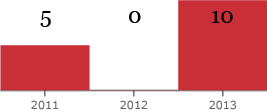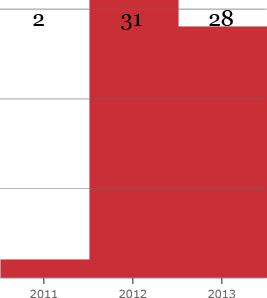Despite King Hamad’s praise for the press as the “cornerstone of human rights and a mirror of our fledgling democracy,” the Bahraini government continued to crack down on anyone challenging the official narrative. Journalists covering opposition protests were harassed, detained, and deported, while some were attacked by opposition protesters who considered them biased. The government arrested at least three bloggers and photographers in the lead-up to a major opposition protest on August 14. A court upheld the acquittal of a policewoman accused of torturing a journalist in 2011. Authorities continued to clamp down on online expression by blocking websites, infiltrating social media accounts, prosecuting citizens who insulted officials, and considering restrictions on Internet-based telecommunications services. Bahraini blogger Ali Abdel Imam, convicted on anti-state charges, was forced to flee into exile after hiding for two years from Bahraini authorities.
Bahrain
» Journalists imprisoned pre-emptively to prevent coverage of protests.
» ‘Blogfather’ Ali Abdel Imam flees Bahrain after two years in hiding.
Despite King Hamad’s praise for the press as the “cornerstone of human rights and a mirror of our fledgling democracy,” the Bahraini government continued to crack down on anyone challenging the official narrative. Journalists covering opposition protests were harassed, detained, and deported, while some were attacked by opposition protesters who considered them biased. The government arrested at least three bloggers and photographers in the lead-up to a major opposition protest on August 14. A court upheld the acquittal of a policewoman accused of torturing a journalist in 2011. Authorities continued to clamp down on online expression by blocking websites, infiltrating social media accounts, prosecuting citizens who insulted officials, and considering restrictions on Internet-based telecommunications services. Bahraini blogger Ali Abdel Imam, convicted on anti-state charges, was forced to flee into exile after hiding for two years from Bahraini authorities.
-
3
Journalists in prison -
784
Days "Blogfather" was hiding -
0
Convictions in torture case -
0
Journalists killed
Bahrain ranks 11th worldwide for the number of journalists it holds in prison. But with its tiny population, the country ranks second in the world for the highest number of imprisoned journalists per capita, according to 2012 population figures from the World Bank.
| Rank | Country | Imprisoned (2013) | Population in Millions (World Bank) | Journalists Imprisoned (Per Million) |
| 1 | Eritrea | 22 | 6.1 | 3.59 |
| 2 | Bahrain | 3 | 1.3 | 2.28 |
| 3 | Azerbaijan | 8 | 9.3 | 0.86 |
| 4 | Gambia | 1 | 1.8 | 0.56 |
| 5 | Turkey | 40 | 74.0 | 0.54 |
| 6 | Syria | 12 | 22.4 | 0.54 |
| 7 | Macedonia | 1 | 2.1 | 0.47 |
| 8 | Iran | 35 | 76.4 | 0.46 |
| 9 | Jordan | 2 | 6.3 | 0.31 |
| 10 | Kuwait | 1 | 3.3 | 0.31 |
Ali Abdel Imam, known as the "Blogfather," went into hiding in 2011 to avoid arrest as the government cracked down on prominent opposition voices. After two years, he suddenly appeared safely in the United Kingdom.
February 27, 2005: | Ali Abdel Imam is detained for two weeks and interrogated about Bahrain Online, a popular opposition forum he founded in 1999. |
September 4, 2010: | Abdel Imam is arrested on charges of “spreading false information.” |
February 14, 2011: | Thousands of Bahrainis hit the streets to protest against the government. |
February 23, 2011: | Abdel Imam is released as part of a general amnesty in response to protests. |
March 17, 2011: | Abdel Imam tweets for the last time before going into hiding. |
March 18, 2011: | Authorities raid Abdel Imam's house, but he is not there. |
June 22, 2011: | A military court sentences Abdel Imam in absentia to 15 years in prison for attempting to overthrow the regime. |
September 28, 2011: | A military court upholds Abdel Imam’s sentence. |
April 17, 2012: | CPJ joins other human rights groups in writing a public letter in support of Abdel Imam and other imprisoned opposition leaders. |
September 4, 2012: | The Civilian High Court of Appeals upholds Abdel Imam’s sentence. |
May 9, 2013: | Al-Jazeera reports that Abdel Imam has successfully fled to the United Kingdom. |
Though the Bahraini government has efficiently prosecuted opposition voices, it has not held a single official accountable for the reported torture in 2011 of France24 and Radio Monte Carlo reporter Nazeeha Saeed in government custody.
The interrogation: | Police summoned Nazeeha Saeed for interrogation on May 22, 2011, amid mass unrest in the country. They questioned her about her reporting and accused her of participating in protests and calling for the downfall of the regime, charges she denied. |
The accusation: | According to the Bahrain Independent Commission of Inquiry, Saeed claimed she “was repeatedly kicked and beaten with a rubber hose by a number of police officers.” In addition, she alleged “that she was electrocuted on her arm, had urine poured on her face, had a shoe forced into her mouth and her head plunged into a toilet to simulate drowning.” The commission was established by King Hamad and presented its findings on November 23, 2011. |
The trial: | Saeed filed a complaint against five police officers in January 2012. Only one policewoman faced trial, and she was acquitted of all charges on October 22, 2012. The acquittal was upheld by an appeals court on June 23, 2013, Agence France-Presse reported. |
No journalists were killed in Bahrain this year, a sharp contrast to the previous two years, in which three journalists were killed.
Bahrain |  |
Egypt |  |
Iran |  |
Iraq |  |
Israel and the Occupied Palestinian Territory |  |
Libya |  |
Syria |  |
Tunisia |  |
Yemen |  |
